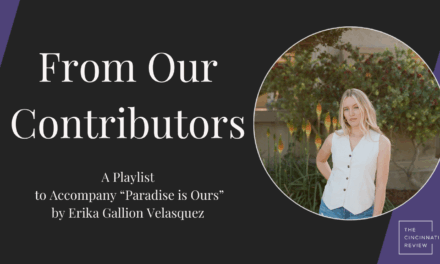The days during which Issue 8.2 can be proud of its status as newest, youngest issue are waning: Issue 9.1 is at the printer and will make its debut in the next few weeks. We don’t want to overlook the amazingness of 8.2, though, so we’ll celebrate it one last time with a series of comments from contributors about their pieces:
Tara Bray (on “Doubts of a Striving Contortionist”): This poem grew out of my fascination with the body and with anyone who strives to push against the body’s limits. Also, I am interested in the flip side of passion for anything, be it art, sport, hobby, or matters of the spirit. To give oneself completely to what requires so much of us is at times a source of doubt and discontent, yet often we keep on without knowing why. The ending image was inspired by the ta∂åka mudra, which involves drawing the front of the waist toward the back of the waist. Ta∂åka, in Sanskrit, means pool.
Todd Hearon (on “Mnemosyne”): Mnemosyne, mother of the muses, is the goddess of memory. Ironically, I have no memory of what inspired this piece or how it was composed. I think it grew out of a fragment—some form of advice a father (or business tycoon) might give:
ON MEMORY
Forget it. There’s no future in it.
I do remember that it came quickly, and surprised me in the form of a sonnet. I also remember being surprised during the writing that it came out on about two rhymes. But that shouldn’t surprise, rhyme being one of the best forms of mnemonics.
Glenn Shaheen (on “Public Works” and “Sensationalism”): For a week or two I had this restructured grammar running through my head, something that had a distinctive rhythm but was “wrong,” but not wrong in a common way or a way we’d look down on to give our pity (both actions, of course, “wrong” as well). The wrongness was distinctly musical, and obeyed its own rules of structure and sound but maintained the specific communicative goals of normalized grammar, not eschewing clarity, not of idea at least. So it was stuck in my head, and over a week or two I wrote out four poems in a loose first-person plural, trying to create this character of a chorus that spoke about community, in the sense of a city, a nation, a people, in this grammar. Then I had these four poems, and I liked them enough to figure I’d come back and write more, but whenever I tried to a few weeks later, I couldn’t find the same sound, and only those first four (two of which appear in The Cincinnati Review) ended up surviving edits, revisions, hacks, and slashes. So I guess that’s a lesson about running with the muse whenever it calls, right? Well, I doubt I could have put a whole manuscript of these together anyway without a certain degree of tedium, so it’s probably for the best, as much as anything is for the best.
Faith Shearin: My poem “Dogs Waiting for their Owners” was written after a few spring days at the local dog park. I had been thinking about waiting, and the images of dogs tied to trees or standing in the backs of trucks offered themselves to me. The more I thought about the dogs, the more I also thought about the waiting I had done in my own life and the waiting I had read about in myths.










